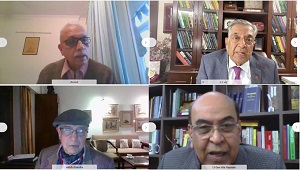The Vivekananda International Foundation organised a Vimarsh dialogue in the shape of a book discussion on “The Kashmir Conundrum: The Quest for Peace in a Troubled Land,” authored by General NC Vij, PVSM, UYSM, AVSM, on the 27th of December 2021. The event was chaired by Dr. Arvind Gupta, Director, VIF. The book discussion was followed by comments by an eminent panel consisting of Amb. Satish Chandra, Former Deputy National Security Advisor & Vice Chairman, VIF along with Lt Gen S A Hasnain, PVSM, UYSM, AVSM, SM (Bar), Former GOC 15 Corps.
Dr. Arvind Gupta, Director VIF, introduced the speakers and delivered his opening remarks. The Director noted that the book shall invite much attention within the country and has contributed greatly to the debate on J&K (Jammu and Kashmir). He highlighted that it is one of the few books that discusses the change that happened in J&K since the nullification of Articles 370 and 35A, which has in turn introduced new dynamics in the internal, regional, and international situations. He observed that both Pakistan and China have been rattled with the changes. The Director argued that the bifurcation of Jammu and Kashmir has engendered mixed responses in the state. Yet, violence and terrorism are still prevalent in the J&K. He also noted that there has been a sharp increase in the developmental activities in Jammu and Kashmir. The Director elaborated about the ushering in of new politics in the J&K, such as encouragement of politicians from grassroots which are relatively more recent and younger stakeholders. He argued that there are no easy solutions to J&K issues, which have festered since 1947. However, the trajectory marked by the changes done in August 2019 created a clarity of purpose and was a manifestation of proactive approach by the government. The Director notes a critical aspect bought out by General Vij in his book about the increasing trends about Islamic radicalization in J&K. The Director highlights that the author through his book,addresses all important questions and offers very sensible solutions to deal with emerging situations.
The Director also noted that the author has argued in favour of withdrawing AFSPA (Armed Forces Special Powers Act) in peaceful areas, and in the long run, the police and paramilitary should take charge of the internal security situation.
General N C Vij started his presentation by narrating his experiences of witnessing J&K in its varied degrees of turbulence right from the very beginning. He emphasised that his book is not based upon his childhood impressions but rather on experiences during his service in the army as the DGMO during Kargil, Vice Chief during Operation Parakram, and as a Chief of Army Staff during an intense period of insurgency. While talking about the insurgencies in Kashmir, the General recounted that there were many ups and downs in the history of insurgency in Kashmir. However, the defeat during the Kargil War brought much humiliation to the Pakistanis, and had discernible impact on their thinking of using insurgency to control J&K. The Burhan Wani incident in 2016 resulted in insurgency picking up pace in Kashmir. The General in his book argues further that this led to a rise in a lot of young boys becoming terrorist commanders. Secondly, women also joined the insurgency in significant numbers. Thirdly, it also gave rise to street turbulence and stone-pelting in the valley. Finally, this was also instrumental in increased attacks on police stations and snatching of weapons.
The author opined that it was wise not to separate Jammu from Kashmir after the state's bifurcation because Jammu is essential to hold Kashmir with India. With the abrogation of Article 370 and 35A, the Kashmiris were surprised and taken aback and realised that Pakistan could not do much in the international arena except raise its issue, which in turn was of no use to them.
The General underlined the need for multi- ministry, multi-agency organisations to frame doctrines, strategies, and policies. He argued that perception management is one of our weakest areas, as it takes us a lot of time to convince the world. Therefore, he recommended setting up a high-powered committee for perception management, which shall comprise government and public figures.
Concluding his remarks, the General argued that India must create pressure points to handle Pakistan. These pressure points include non-cooperation on the Indus water treaty, rejecting the Durand Line etc. He recommended that after the Delimitation of J&K, there must be elections, and there should be a popular government elected to power. He argued that the insurgency is not going to go away soon; instead, it may reduce once Pakistan's financial situation worsens. The General also recommended that the bureaucracy and administration must improve its performance by the time the next state government comes to power. Finally, the litmus test for peace in Kashmir would be when Kashmiri pundits go back to Kashmir.
Ambassador Satish Chandra began his presentation by appreciating the book, and he highly recommendsed the book to people interested in learning about Jammu and Kashmir. The Ambassador argued that one of the book's features is that it's a very comprehensive and holistic work that deals with the military and all other aspects of the state. He observed that the author has left very little detail untouched, thereby encompassing all major themes such as religion, Indian connection, nature of Kashmiriyat, strategic importance, constitutional relationship, consultations in the UN, military confrontations, the effect after the abrogation of Article 370 etc. Amb. Chandra noted that most of the book's assessments are perceptive and are based on impeccable logic. He highlighted some important parts from the book and concurred with the author on the necessity of penalising Pakistan. Amb. Chandra argued that the Shimla pact was an unmitigated failure, and one of the major results of the pact was conceding away of about five thousand to six thousand square kilometres back to Pakistan. Instead, the Kashmir issue should have been resolved.
Talking about the Kashmiri political mindset, Amb Satish Chandra opined that a similar tone was taken by Jagmohan, the former governor of J&K in his book ‘The Frozen Turbulence in Kashmir’ in which he states that “Sheikh Abdulla was a Communalist in Srinagar, a communist in Jammu and a nationalist in Delhi.” Later on, Jagmohan says that “Most Kashmiri politicians are adept at speaking with two voices. They can be secular and communal, democratic, or dictatorial, secessionist or pro-Pakistan. Underlying motivation are not principles but power.”
Amb. Chandra disagrees with the author on revisiting the nuclear doctrine and manufacturing tactical nuclear bombs. Instead, he argued that the current nuclear doctrine continues to serve India’s interests well and instead use the fissile material to make missiles in more significant numbers to deter China and Pakistan. In conclusion, Amb. Chandra seconds the authors' proposition on creating a perception management organisation and agreed that we are falling behind in managing perceptions.
Lt Gen S A Hasnain began his presentation by highlighting that the book is very comprehensive and observed that the book shall remain an essential textbook on Jammu and Kashmir for future generations. On the issue of perception management, Lt Gen Hasnain noted that an analysis of Operation Sadbhavana would clearly indicate it was a sub tactical achievement and that bringing Op Sadbhavana at a strategic level is still not being done. According to him we are still tactical and sub tactical in our approach to perception management. He later emphasised that an important point brought out by the author through his book is that Op Sadhbhavana should be a government-run national initiative rather than an army-run operation.
Lt Gen Hasnain talked about AFSPA and need for having a relook on it in certain districts. He argued that the AFSPA needs a review and a re-enactment of AFSPA since the current language is too harsh and was framed in a period when human rights received less attention. Given the change of situation in Afghanistan, Pakistan today feels very confident of conducting hybrid warfare in Punjab and Jammu and Kashmir. He was pessimistic of the likelihood of peace in J&K potential in the next 8-10 years.
Talking about the ‘Jammu conundrum’, he stated that Jammu is unhappy since they wanted a trifurcation of the state however there is an intrinsic link with Srinagar in terms of interdependency in business, culture, and also an emotive interdependence. Lt Gen Hasnain was convinced that a solution for Kashmir would only emerge from Jammu. Therefore, Jammu cannot be detached from Kashmir.
Lt Gen Hasnain concluded his presentation by stating that we must look at Jammu and Kashmir politically, economically, socially, militarily, and most importantly, psychologically. We need to have a strategy in place, and we cannot look at conflict termination yet. We also need to improve our diplomatic narrative so that India’s case is presented to the international audience well.
The Director gave the concluding remarks and thanked the speakers for their presentation. The session was also followed by a question-and-answer session.







Post new comment